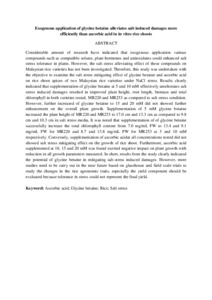Citation
Teh, Chui Yao and Shaharuddin, Noor Azmi and Ho, Chai Ling and Mahmood, Maziah
(2016)
Exogenous application of glycine betaine alleviates salt induced damages more efficiently than ascorbic acid in in vitro rice shoots.
Australian Journal of Basic and Applied Sciences, 10 (16).
pp. 58-65.
ISSN 1991-8178; ESSN: 2309-8414
Abstract
Considerable amount of research have indicated that exogenous application various compounds such as compatible solutes, plant hormones and antioxidants could enhanced salt stress tolerance in plants. However, the salt stress alleviating effect of these compounds on Malaysian rice varieties has not been investigated. Therefore, this study was undertaken with the objective to examine the salt stress mitigating effect of glycine betaine and ascorbic acid on rice shoot apices of two Malaysian rice varieties under NaCl stress. Results clearly indicated that supplementation of glycine betaine at 5 and 10 mM effectively ameliorates salt stress induced damages resulted in improved plant height, root length, biomass and total chlorophyll in both varieties tested, MR220 and MR253 as compared to salt stress condition. However, further increased of glycine betaine to 15 and 20 mM did not showed further enhancement on the overall plant growth. Supplementation of 5 mM glycine betaine increased the plant height of MR220 and MR253 to 17.0 cm and 13.3 cm as compared to 9.8 cm and 10.3 cm in salt stress media. It was noted that supplementation of of glycine betaine successfully increase the total chlorophyll content from 7.0 mg/mL FW to 13.4 and 9.1 mg/mL FW for MR220 and 8.7 and 13.8 mg/mL FW for MR253 at 5 and 10 mM respectively. Conversely, supplementation of ascorbic acidat all concentrations tested did not showed salt stress mitigating effect on the growth of rice shoot. Furthermore, ascorbic acid supplemented at 10, 15 and 20 mM was found exerted negative impact on plant growth with reduction in all growth parameters measured. In short, results from the study clearly indicated the potential of glycine betaine in mitigating salt-stress induced damages. However, more studies need to be carry out in the near future based on glasshouse and field scale trials to study the changes in the rice agronomic traits, especially the yield component should be evaluated because tolerance in stress could not represent the final yield.
Download File
![[img]](http://psasir.upm.edu.my/54227/1.hassmallThumbnailVersion/Exogenous%20application%20of%20glycine%20betaine%20alleviates%20salt%20induced%20damages%20more%20efficiently%20than%20ascorbic%20acid%20in%20in%20vitro%20rice%20shoots.pdf)  Preview |
|
Text
Exogenous application of glycine betaine alleviates salt induced damages more efficiently than ascorbic acid in in vitro rice shoots.pdf
Download (6kB)
| Preview
|
|
Additional Metadata
Actions (login required)
 |
View Item |

